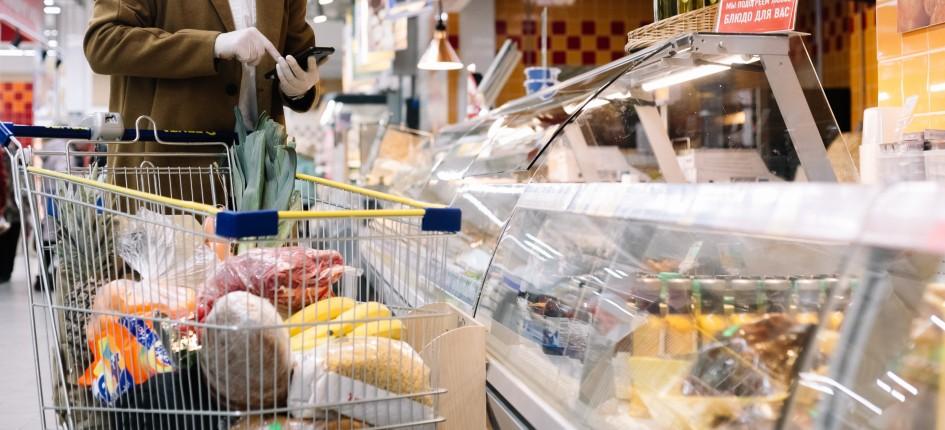Despite the ongoing pandemic, Mrs Ekaterina Lomakova, Vice President, Azbuka Vkusa believes there is a positive dynamic in the Russian food market and the demand for premium grocery.
Have you noticed any changes in the behaviour of your customers during the pandemic?
Our constant analysis of customer preferences shows that the structure of demand changed during the pandemic but we have not noticed any significant changes in consumer habits.
In mid-March, like most grocery retailers, we noticed a significant increase in bulk buying and by mid-April there was a rise in demand for fresh products - vegetables and fruits, fresh meat and fish and dairy - which we associated with increases in home cooking. Demand for alcohol beverages increased during the entire period of self-isolation and continued after the end of lockdown, largely due to border closure, travel and HoReCa (Hotel, Restaurant and Catering sector) restrictions which resulted in the growth of home consumption.
Recently, we also noticed some interesting changes such as customers more often buying a full basket in one store as opposed to dividing their purchases between different supermarkets. A direct consequence of the pandemic is a decrease in store traffic which has not yet recovered from last spring. However, the average check has increased and continues to consistently grow resulting in growth of our chain’s turnover.
Are you interested in new brands at the moment? Perhaps there are categories that are under-represented and you are actively searching for new suppliers?
After the imposition of sanctions on the Russian market, Switzerland is the only European country allowed to import dairy products into Russia. As a result, Switzerland is today for us a key supplier of cheese. Swiss chocolate is also well-represented. However, in non-food, other grocery and drinks the share of Switzerland is relatively small and therefore we see opportunity for expansion. We always aim to expand and update our range of products and are constantly searching for new partners. But, quite frankly, we are keen to work with producers who are interested in Azbuka Vkusa as their exclusive partner in Russia.
Since the founding of Azbuka Vkusa, having market exclusivity for certain products as well as direct import in a number of categories has been one of our competitive advantages. This is what makes us unique for our target audience. A large proportion of our customers are regular or repertoire shoppers who come to shop for certain imported goods and delicacies specifically. Some of the brands we import exclusively are Butlers (chocolates from Ireland), Wittard of Chelsea (tea from England), Ghiott (biscuits from Italy), Sarah Horne and Emma Dune (tableware from England) and many others.
It is important to take into account that Swiss goods, which may be mass market in their local market, will automatically become premium in Russia.
This is mainly due to the fact that the final price of the product will include currency fluctuations and cost of logistics. For most Russian retail chains, this is quite a deterrent for the expansion of potential cooperation.
In this regard, Azbuka Vkusa has a serious competitive advantage: our target audience is well travelled, familiar with many European brands and prepared to buy them in Russian stores. For quite a few years now we have been focusing on healthy food and see a lot of interest for this particular category from our shoppers. Our research demonstrates that people begin to combine different types of diets without restricting themselves too much, trying new products as a way to enrich their diet. To meet those needs, we are constantly expanding our range of healthy and organic products, including those from European producers.
What is the procedure for working with European manufacturers and the procedure for bringing a new brand to the shelf? What are the requirements for the supplied food products?
Usually, our category managers search for new suppliers. They attend international fairs and exhibitions or explore the shelves in foreign supermarkets. During the pandemic and with the borders being closed, all these processes moved online. Also, we are often approached by the suppliers themselves and for this purpose we have a section on our website where they can leave an application for partnership and information about their assortment.
To start cooperation with a new supplier, we take into account several criteria. A mandatory requirement is the availability of safety certificates and compliance with the requirements for manufacturers in terms of product quality.
We also analyse the value of the product in the local market and compare it with the final price on our shelf, taking into account all additional costs. We assess brand positioning to determine if we can correctly represent it on the Russian market and convey values.
Basically, we purchase goods directly from suppliers, independently declare and prepare the necessary documentation, and provide logistics. But in certain categories of goods, we work with distributors - for example, with goods that require a refrigerated storage temperature, and with frozen products.
Who is responsible for marketing and promotion of a new brand: manufacturer, supplier or Azbuka Vkusa? Or is this a combined effort of all three?
Obviously, we are interested in the promotion of our own unique imported assortment, which allows us to remain differentiated from the rest of the market. We work together with each particular supplier to create brand related promotional activities. We employ a large marketing team and do most of the marketing and promotional activities ourselves. Depending on the objectives, we develop marketing activities in our social media and on our website, carry out in-store promotions and highlight products on shelf.
Tell us about the development of e-commerce and e-grocery in Azbuka Vkusa.
In 2020, the share of e-commerce in total sales of our retail chain increased from 3% to 6%, and we plan to continue developing it. We were one of the first in the market to launch an online shop back in 2008. On our online version you can buy a full range of groceries and non-food items and choose a delivery time slot in Moscow, the Moscow Region and St. Petersburg. We are also actively developing the "AV Express Menu” which is our fast delivery service where you can order essential products and our own production ready meals, delivered within 30 minutes.
During lockdown, we started partnering with the largest Russian food delivery services such as Yandex.Food, Yandex.Lavka, Delivery Club and Samokat. Our private labels and directly imported goods are presented on the Ozon and Goods.ru marketplaces. These partnerships give us the opportunity to enter regional markets, attract new clients and interact with the target audience in cities where Azbuka Vkusa is not represented.





